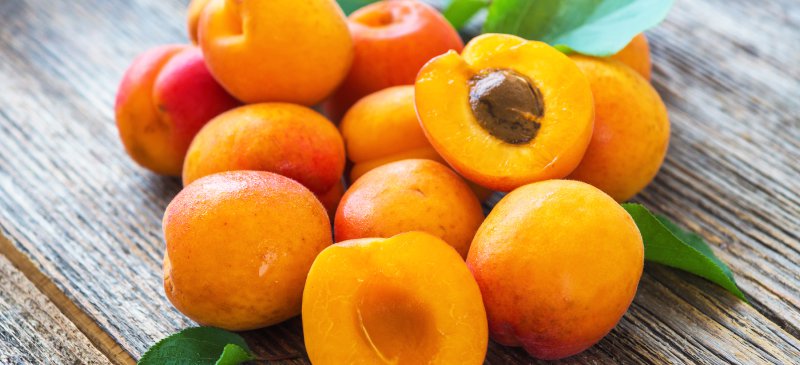
Apricots. A daily nutrition booster.
Alexander the Great fell in love with a small, orange, surprisingly sweet fruit in Asia, where he found them growing wild.
When he returned to Europe from his military expeditions, he brought some with him.
The ancient Romans gave the apricot its name – from the Latin word for “precocious” – because the apricot is the first fruit of the season to ripen.
The name stuck, and the apricot spread all over, from Europe to America, and all the way to Australia.
The apricot is a fantastic fruit – loaded with beta carotene, iron, fiber, vitamin C, and several B vitamins.
If you dry an apricot, its nutrients get more concentrated, making dried apricots a great snack.
Whether fresh or dried, eating apricots will help you fight the effects of aging, protect your eyesight, ward off cancer, and prevent heart disease.
The 4 prevention profiles of apricots:
Combat cancer
If you get indigestion from eating tomato products – the prime source of lycopene – here’s great news for you.
Apricots, especially dried ones, are another source of lycopene, the amazing carotenoid that can help prevent prostate, breast, and several other cancers.
Though apricots aren’t nearly as good a source of lycopene – about 30 dried ones have the same amount as one tomato – munching on them throughout the day can boost your lycopene quicker than you think.
Apricots are also a good source of the most famous carotenoid of them all – beta carotene.
This powerful antioxidant reduces your risk of some types of stomach and intestinal cancers.
To get these benefits, experts suggest getting at least 5 milligrams of beta carotene each day.
That’s equal to about six fresh apricots.
Halt heart disease
Eating dried apricots as a snack can punch up your levels of iron, potassium, beta carotene, magnesium, and copper.
These important nutrients help control your blood pressure and prevent heart disease.
Plus, as few as five dried apricots can give you up to 3 grams of fiber, which sweeps cholesterol out of your system before it has a chance to clog your arteries.
Chase away cataracts
What you eat can affect your vision.
Dr. Robert G. Cumming, the lead researcher for the Blue Mountains Eye Study, says, “Our study confirms the importance of vitamin A for cataract prevention.”
Cumming adds, “Our overall conclusion is that a well-balanced diet is needed for eye health.”
Since apricots are a good source of beta carotene, which your body converts to vitamin A, and several other nutrients, they could be just what you’re looking for.
Increase life expectancy…?
Believe it or not, some people claim apricots are the secret to living to age 120.
They get this idea from the Hunzas, a tribe living in the Himalayan Mountains of Asia.
Common health problems, like cancer, heart disease, high blood pressure, and high cholesterol, do not exist in Hunza.
And, researchers are wondering if apricots, the main part of their diet, are partly responsible.
The Hunzas eat fresh apricots in season and dry the rest to eat during their long, cold winter.
Although eating apricots can’t guarantee you’ll live a long life, recent research suggests the little fruit may help you live a better life.
The B vitamins in dried apricots may protect you from Alzheimer’s and age-related mental problems, like memory loss.
Where to buy from:
Because this wonderful fruit has been grown in so many major locations all over the world, sourcing good apricots for consumption is incredibly easy.
Most if not all grocery stores should have seasonal produce, and dried apricots can be found all year round, as they have a substantial shelf life when appropriately stored.
In our experience, the best dried apricots are coming from the Mediterranean, though there are still very high-quality local producers in Australia and the USA.
We hope these tips provide you with some insights and assistance to living your most brain healthy life.
If you enjoyed reading this blog, and want to see more of our articles relating to nutrition and brain healthy foods, check out the links to some of our other articles below:
- How Iron and B Vitamins Improve Brain Activity
- Can Vitamin C and E Help Prevent Dementia?
- We Are What We Eat
Be sure to hit the SUBSCRIBE button below so we can send you new feature articles and videos just like this one, as we release them.
[hubspot type=cta portal=5502853 id=b6abb010-c90d-42a9-a9c7-01be1dbcced9]
If you would like us to feature a particular topic or interest in one of our upcoming articles or videos, leave a comment below with the details or alternatively, send us an email to info@brainfitresorts.com.
We’d love to hear what’s on your mind.
Finally, if you know someone who may benefit from this article or any of our other features, please SHARE this article with them using the icons below, and help us to better enrich the lives of those who need it.
Until next time… Live Strong. Live Well. Live BrainFit.

